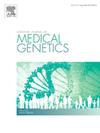Cost-comparison of resequencing versus archival data methods for periodic reanalysis of genomic data in rare diseases diagnosis: A UK pilot analysis
IF 1.7
4区 医学
Q3 GENETICS & HEREDITY
引用次数: 0
Abstract
Periodic reanalysis of genome sequence data in rare diseases to improve diagnostic rates is recommended every 18-months. However, cost can be a major consideration. We compared the cost of two reanalysis methods: (A) resequencing of stored DNA and (B) archived genome data. We selected 30 trios with diverse molecular diagnoses for reanalysis from the published Next Generation Children Project (NGC), which used whole genome sequencing (WGS) on a paediatric cohort from NICU/PICU. Of these, 29 trio samples passed the DNA QC, were re-sequenced (Method A), or their initial sequence data retrieved from archival (Method B) prior to gene diagnostic analysis. Both Methods A and B detected 100 % (41/41) of the known diagnostic variants, with assessors blinded to previous findings. We performed cost comparisons per trio and UK NHS rare diseases (NICU/PICU) cohort national scale including analysis and data storage costs. While re-sequenced WGS data showed a higher quality of Q30 reads (median 89.9 %) as compared to archived data (median 86.54 %), the cost per trio was £5021.17 and £2136.96, respectively (difference of £2884.21). Extrapolating to a national UK paediatric intensive care cohort (∼90K admissions per annum) with gene agnostic analysis, Method B yields significant cost savings, even with only one reanalysis. Periodic WGS reanalysis using archival data is as accurate as resequencing at a lesser cost per trio but at scale this requires federated archival data repositories.
罕见病诊断中定期再分析基因组数据的重测序与档案数据方法的成本比较:一项英国试点分析
建议每18个月定期重新分析罕见疾病的基因组序列数据,以提高诊断率。然而,成本可能是一个主要考虑因素。我们比较了两种再分析方法的成本:(A)存储的DNA重测序和(B)存档的基因组数据。我们从已发表的下一代儿童计划(NGC)中选择了30个具有不同分子诊断的三胞胎进行再分析,该计划对来自NICU/PICU的儿科队列使用了全基因组测序(WGS)。其中,29份三人样本通过DNA QC,重新测序(方法A),或在基因诊断分析之前从档案中检索其初始序列数据(方法B)。方法A和方法B检测到100%(41/41)的已知诊断变异,评估者对先前的发现不知情。我们进行了三人组和英国NHS罕见病(NICU/PICU)队列全国范围内的成本比较,包括分析和数据存储成本。虽然重测序的WGS数据显示Q30 reads的质量(中位数为89.9%)高于存档数据(中位数为86.54%),但每三个reads的成本分别为5,021.17英镑和2136.96英镑(差异为2,884.21英镑)。外推到英国国家儿科重症监护队列(每年约90K)进行基因不可知性分析,方法B即使只进行一次再分析,也能显著节省成本。使用档案数据的周期性WGS再分析与重排序一样准确,每组成本更低,但在规模上需要联合档案数据存储库。
本文章由计算机程序翻译,如有差异,请以英文原文为准。
求助全文
约1分钟内获得全文
求助全文
来源期刊
CiteScore
4.10
自引率
0.00%
发文量
193
审稿时长
66 days
期刊介绍:
The European Journal of Medical Genetics (EJMG) is a peer-reviewed journal that publishes articles in English on various aspects of human and medical genetics and of the genetics of experimental models.
Original clinical and experimental research articles, short clinical reports, review articles and letters to the editor are welcome on topics such as :
• Dysmorphology and syndrome delineation
• Molecular genetics and molecular cytogenetics of inherited disorders
• Clinical applications of genomics and nextgen sequencing technologies
• Syndromal cancer genetics
• Behavioral genetics
• Community genetics
• Fetal pathology and prenatal diagnosis
• Genetic counseling.

 求助内容:
求助内容: 应助结果提醒方式:
应助结果提醒方式:


